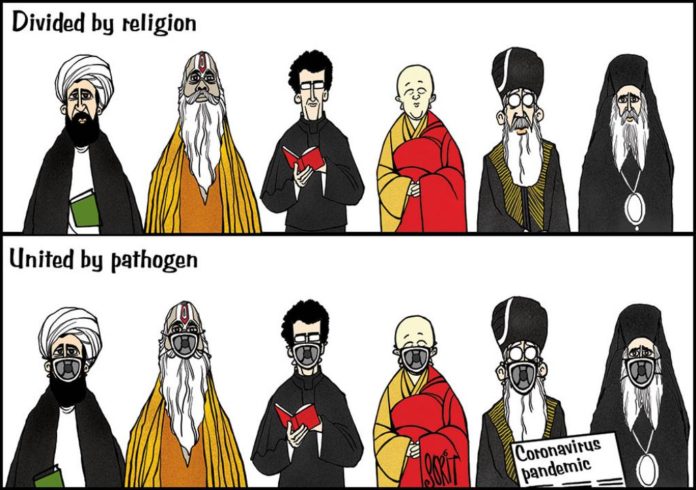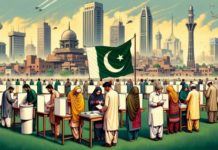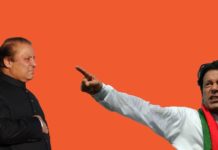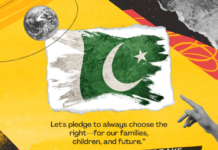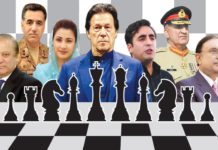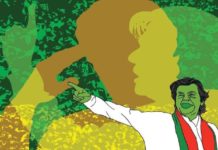Pakistan’s history is replete with fiascos that have rendered to be great lessons for her leaders and citizens. Since the inception of Pakistan, the state has been caught in inimical episodes of power confiscation. Adding to the woes, the leaders and the citizens have been unable to understand the true essence of the Islamic ideology of Pakistan. The one serious ramification is that it has been unable to adapt to the new challenges.
Islam and Pakistan
Islam is a complete code of life. It ingrains the fundamental concepts and teachings which embodies the whole society. It inculcates not only the customs, rituals and worships that are necessary for submitting fealty to the Almighty but also lays down the guiding principles of living in a society.
This has to be understood that Muslims all over the world although have same religion but differ in their cultures, sects etc. They are divided into different subgroups; Sunni, Shiite, Deobandi etc. In united India, the Muslims ignored all the differences and focused on the commonality to unite so as to end the religious persecutions. This culminated into a religious political movement. Jinnah – the ambassador of Hindu Muslim unity – was then convinced that Muslims and Hindus are separate ‘identities’. For them to live peacefully and for the minorities to enjoy the rights, a separate nation-state needs to be created. This led to creation of Pakistan, a separate homeland for the Muslims of India.
Conflict Between Identity and Ideology
Pakistan was formally called Islamic Republic. The Islamic ideology was the foundation on which the state structure had to be laid upon. In the historical context, Islamic ideology pertains to two ideas – democratic norms vs puritanical Islam- which remains an unsettled issue even after 70 years. The nation was lost in translation of the Muslim political movement. It failed to renew its agenda, as the nation was no longer in the formative phase. The necessary transition never took abode. The concept of two nation theory does not only highlight the religious incompatibility of Hindus and Muslims but it also contours the socio-economic impact upon Muslims. Therefore, Muslim political movement culminated into a much greater movement. However, this movement could not mold itself into the nascent structure. The repercussions were profound in the differences between West and East Pakistan which resulted in a split.
Bifurcation of East and West Pakistan rested upon the illusion of unity that grappled the minds of the inheritors of power. Religion was mixed with politics and was used by the politicians to gain their parochial interests. The reason why the two nation theory felt serious blow was the failure to comprehend the difference between identity and ideology. The state leaders who were caught in struggle to acquire power in the Hobbes state of nature failed to establish clarity on identities. Or this could be said that the post partition state of Pakistan did not possess a leader with qualities that could respect the identities and the ideology at the same time. This had led to a sharp divide between religion, politics, military and judiciary. Religion remains a separate guide for those who wish to use it for their own benefit.
Which is the greater threat: Virus or Mullah?
Pakistan was a dream that was achieved through great sacrifices of Muslims and the struggle of the great leaders. The early death of Quaid e Azam, followed by Liaquat Ali khan was a huge setback for the new born country. Post partition was even a greater task for the Pakistani’s to cater. A confused state of mind controlled Pakistan. Involvement of Pakistan in the foreign wars, rise in militancy, sectarian violence have sensitized the state. The radicals have already damaged the state by creating great human and capital loss.
In the present crisis situation of COVID-19, the mullahs instead of protecting and contributing to the welfare of the state are applying some baseless logics. At a time when the state should be united to fight the common enemy, the mullahs are not above abusing and instrumentalizing the importance they possess over the Pakistani public.
The Prophet Muhammad (SAW) said: “The sick should not be mixed with the healthy.”
How can the clerics so daringly call out the people to gather when such a serious disease is likely to spread and cause suffering to people? Mullah Virus vs Covid-19
After the key meeting took between the key leaders they announced in a press conference at Karachi Press Club that were going ahead to open the mosques for congregational prayers and lock down restrictions would no longer apply to them. Meanwhile, the announcement came minutes after PM Imran Khan’s government extended the countrywide lockdown by two weeks. The Ulema have completely disregarded the health implications and also the capacity of the state to deal with such a menace. The clerics, however, ensure that they will follow all the precautionary measures. But social distancing would be difficult to maintain when a huge crowd of Muslims gather in mosques to offer prayers and taraweeh during the Holy month of Ramadan.
Fatwas
The Supreme Ulema Council (SUC) of Egypt’s Al-Azhar University has issued a fatwa, banning all congregational prayers at mosques to contain the spread of coronavirus outbreak. UAE Shariah Council has already issued a fatwa by suspending prayers in UAE mosques as a precaution against coronavirus. The head of fatwa department Dr Ahmad Abdul Aziz Al Haddad said, “Shariah is all encompassing and puts appropriate solutions for such emergency conditions.” Two holy sites of Islam in Saudi Arabia, the Prophet’s Mosque in the city of Medina and the Great Mosque of Mecca, will stay closed during the fasting month of Ramadan. Earlier in the month, Saudi Arabia’s Hajj and Umrah Ministry asked Muslim pilgrims all over the world to refrain from visiting. The main holy sites were also closed for visitors, to disinfect the area.
Meanwhile, the Ulema in Pakistan are divided and have completely disregarded the Fatwa’s issued by the competent authorities. Pakistan has been unable to unite in fighting the virus. The legacy continues. The Ulema have declared their own verdict and have decided not to follow the orders of the government. However, now, the government seem to have an understanding with the Ulema to open the mosques, conditionally. The Prime Minister, during this health emergency, has completely ignored the doctors. One ponders that are the Muslims in Egypt, Syria, UAE Kuwait, Turkey and other Muslim countries any less Muslim?
Huqooq-ul-Ibad and Covid-19
As a Muslim, we are concerned about our religious obligations toward Allah (Huqooq ul Allah) while ignoring our responsibilities towards the society. Islam is a religion which guides us about our dealings with creator but gives more importance to our responsibility towards the society. Being compassionate is equivalent to Allah’s worship.
At a time, when a deadly virus is widely spread in the world and has claimed more than a million of lives we need compassion, consideration and unanimity to fight the virus. For the state, the greater responsibility is the safeguard of people, and for the citizens to support the state. Every individual has a huge role to perform in this crisis. It starts with as simple as social distancing and then transcending to a more compassionate purpose that is to give charity and alms to those in need. This is the test of humanity as well as sanity. The geopolitics of coronavirus and religion


